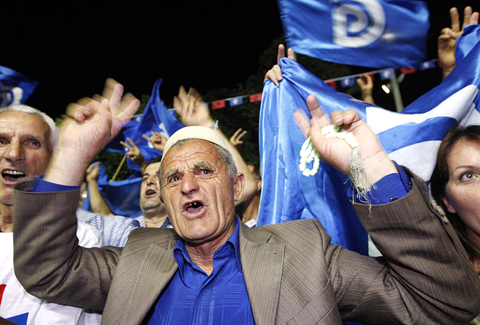With about a fifth of the votes counted, Albania’s ruling party had a narrow lead yesterday after an election that the government, opposition and foreign observers said was fair.
“Albania passed the test” said a headline in the Shqip daily referring to Sunday’s generally calm and orderly voting.
The EU and the US view the ballot as a test of Albania’s readiness for integration with Europe. Western monitors were expected to give their preliminary evaluation of the voting yesterday afternoon.

PHOTO: REUTERS
“I think the voting went very well,” Arben Ristani, the head of Albania’s Central Election Commission said. “The counting of the vote is going along slowly but smoothly in an atmosphere of consensus.”
The US Zogby International agency projected that Albanian Prime Minister Sali Berisha and his Democratic Party would win 69 seats, short of the 71 needed for a majority, compared to 55 for the Socialists led by Edi Rama, mayor of the capital Tirana.
Unofficial results from 938 voting centers, out of the 4,753 nationwide, showed the Socialists were backed by 40.96 percent and the Democrats by 39.31.
REGIONAL SYSTEM
Under a proportional regional system this would translate into 66 seats for the Democrats and 65 for the Socialists.
Official results should by law be announced by 5pm.
Europe’s main human rights and security watchdog, the Organisation for Security and Cooperation in Europe (OSCE), said the vote was mostly orderly, although the main parties had accused each other of manipulation.
“So far it has been relatively calm,” Robert Bosch, the OSCE’s Albania head, said on Sunday. “There are some little irregularities but this time less than in past elections.”
The Socialists led the Democrats in the Tirana area which sends 32 lawmakers to parliament. The Socialist Integration Movement, probably a kingmaker under the regional proportional system, had four seats so far. Albania will elect 140 lawmakers.
Ruled for four decades until 1985 by Stalinist dictator Enver Hoxha, the Balkan country has emerged from long isolation, becoming a NATO member in April and applying the same month to join the EU.
Both candidates favour European integration, more market reforms, improved infrastructure and modernizing Albania’s agriculture. Rama has said he would turn to the IMF for economic help at a time international economists say the economy is stagnating, and Berisha has publicly been more cautious.
“The elections proceeded better than any other election we ever had,” Berisha, 64, the dominant post-communist leader, said shortly after voting ended.
“There have been a few small problems, but no major ones,” he said.
SPEEDING CARS
Berisha’s supporters waved the party’s blue flags from speeding cars around Tirana on late on Sunday to celebrate victory after the results of exit polls were announced, but Berisha did not claim victory.
Rama, 44, gave a cautious thumbs-up to the ballot.
“Despite a series of irregularities and unpleasing details in various parts of the territory of Albania, in general the objective of guaranteeing the process was realized,” he told a news conference.
“I agree with Mr Berisha that there are no losers in this election because European Albania has won,” he said.

VAGUE: The criteria of the amnesty remain unclear, but it would cover political violence from 1999 to today, and those convicted of murder or drug trafficking would not qualify Venezuelan Acting President Delcy Rodriguez on Friday announced an amnesty bill that could lead to the release of hundreds of prisoners, including opposition leaders, journalists and human rights activists detained for political reasons. The measure had long been sought by the US-backed opposition. It is the latest concession Rodriguez has made since taking the reins of the country on Jan. 3 after the brazen seizure of then-Venezuelan president Nicolas Maduro. Rodriguez told a gathering of justices, magistrates, ministers, military brass and other government leaders that the ruling party-controlled Venezuelan National Assembly would take up the bill with urgency. Rodriguez also announced the shutdown

Civil society leaders and members of a left-wing coalition yesterday filed impeachment complaints against Philippine Vice President Sara Duterte, restarting a process sidelined by the Supreme Court last year. Both cases accuse Duterte of misusing public funds during her term as education secretary, while one revives allegations that she threatened to assassinate former ally Philippine President Ferdinand Marcos Jr. The filings come on the same day that a committee in the House of Representatives was to begin hearings into impeachment complaints against Marcos, accused of corruption tied to a spiraling scandal over bogus flood control projects. Under the constitution, an impeachment by the

Exiled Tibetans began a unique global election yesterday for a government representing a homeland many have never seen, as part of a democratic exercise voters say carries great weight. From red-robed Buddhist monks in the snowy Himalayas, to political exiles in megacities across South Asia, to refugees in Australia, Europe and North America, voting takes place in 27 countries — but not China. “Elections ... show that the struggle for Tibet’s freedom and independence continues from generation to generation,” said candidate Gyaltsen Chokye, 33, who is based in the Indian hill-town of Dharamsala, headquarters of the government-in-exile, the Central Tibetan Administration (CTA). It

A Virginia man having an affair with the family’s Brazilian au pair on Monday was found guilty of murdering his wife and another man that prosecutors say was lured to the house as a fall guy. Brendan Banfield, a former Internal Revenue Service law enforcement officer, told police he came across Joseph Ryan attacking his wife, Christine Banfield, with a knife on the morning of Feb. 24, 2023. He shot Ryan and then Juliana Magalhaes, the au pair, shot him, too, but officials argued in court that the story was too good to be true, telling jurors that Brendan Banfield set